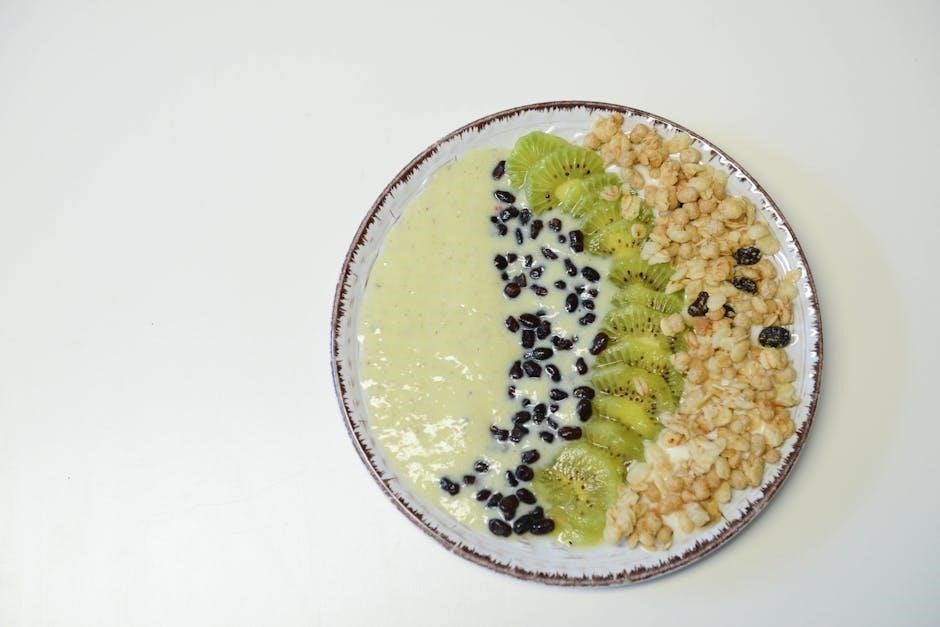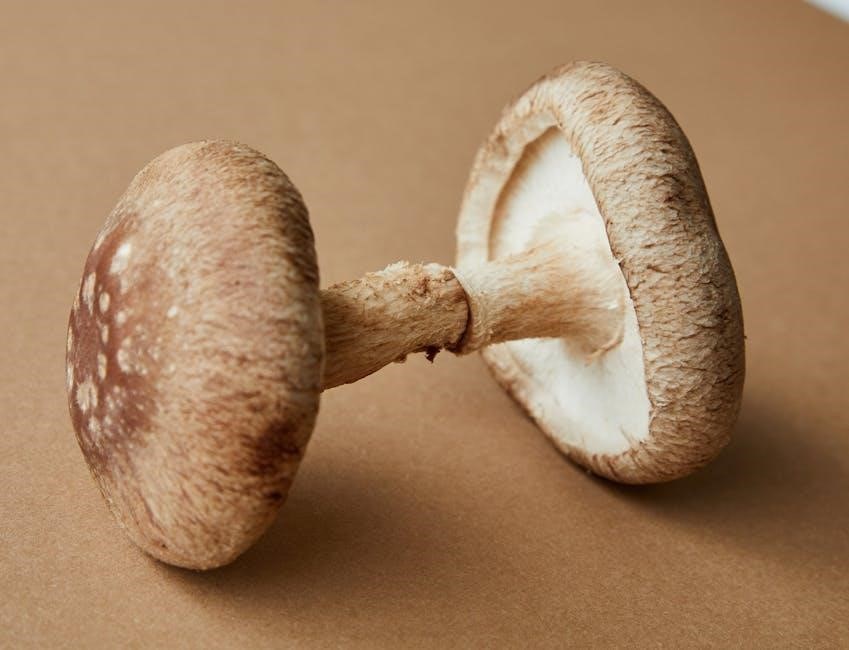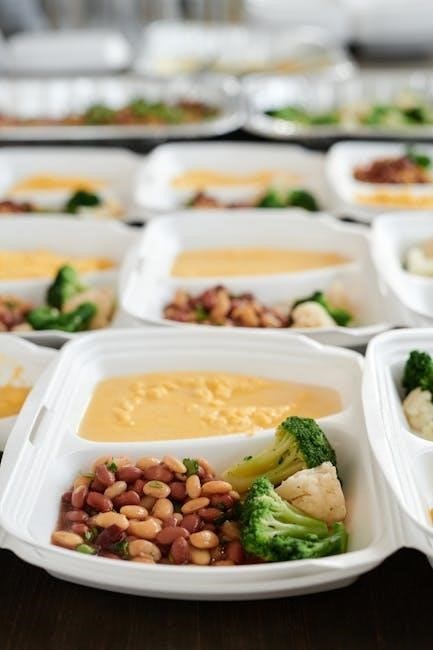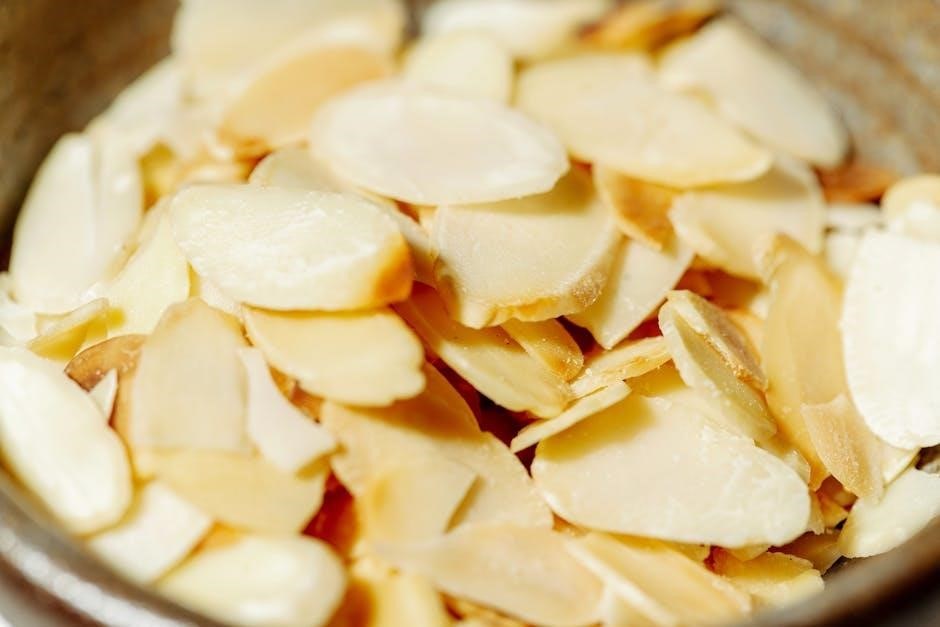
A high-protein, low-carb vegetarian diet combines plant-based protein sources with minimal carbs, promoting weight loss and improved health. It’s a tailored approach for those seeking balanced nutrition without meat.
Health Benefits of a High-Protein, Low-Carb Vegetarian Diet
A high-protein, low-carb vegetarian diet offers numerous health benefits, including weight management, improved blood sugar control, and enhanced heart health. By focusing on plant-based proteins like lentils, beans, and tofu, this diet helps reduce the risk of chronic diseases such as diabetes and cardiovascular conditions. Studies show that vegetarians often have lower blood pressure and cholesterol levels compared to non-vegetarians. Additionally, the emphasis on fiber-rich foods can improve digestion and promote satiety, making it easier to maintain a healthy weight. This dietary approach also supports muscle maintenance and growth, thanks to its high protein content. Overall, a well-planned high-protein, low-carb vegetarian diet can be a nutritious and sustainable choice for long-term health.

Sample 7-Day High-Protein, Low-Carb Vegetarian Meal Plan
This 7-day meal plan offers a balanced mix of high-protein, low-carb vegetarian recipes, featuring lentils, tofu, and legumes, ensuring variety and nutrition throughout the week.
3.1. Breakfast Recipes
Start your day with protein-packed, low-carb vegetarian breakfasts. Try a Chocolate Protein Oatmeal made with oats, almond milk, cocoa powder, and a scoop of plant-based protein powder, topped with fresh berries. Another option is Overnight Chia Seed Pudding, combining chia seeds, almond milk, and nuts for a nutritious and filling start. For a vegan twist, whip up a Tofu Scramble with turmeric, spinach, and nutritional yeast, served with roasted sweet potato slices. These recipes ensure a balanced mix of protein, healthy fats, and minimal carbs, keeping you energized throughout the morning.
- Chocolate Protein Oatmeal with Berries
- Overnight Chia Seed Pudding with Nuts
- Tofu Scramble with Sweet Potato
3.2. Lunch Recipes
Enjoy nutritious, high-protein, low-carb vegetarian lunches with creative and flavorful recipes. A Farmers Market Lentil Salad with fresh cherries, sugar snap peas, and oregano offers a vibrant mix of protein and fiber. For a hearty option, try Mexican Stuffed Capsicums filled with quinoa, black beans, and avocado. Another idea is a Vegetarian Frittata packed with spinach, mushrooms, and feta cheese, perfect for a satisfying midday meal. These recipes are designed to keep you full and energized while adhering to a low-carb, plant-based diet.
- Farmers Market Lentil Salad with Cherries
- Mexican Stuffed Capsicums with Quinoa
- Vegetarian Frittata with Spinach and Mushrooms
3.3. Dinner Recipes
Elevate your evenings with protein-packed, low-carb vegetarian dinners that are both satisfying and nutritious. Try a Tofu Stir Fry with roasted broccoli, bell peppers, and a soy-ginger sauce for a flavorful, protein-rich meal. Another option is Lentil and Vegetable Curry, blending red lentils with spinach, cauliflower, and aromatic spices like turmeric and cumin. For a hearty dish, consider Grilled Portobello Mushroom Caps stuffed with sautéed spinach, garlic, and feta cheese. These recipes ensure a balanced and delicious end to your day while maintaining high protein and low-carb goals.
- Tofu Stir Fry with Broccoli and Soy-Ginger Sauce
- Lentil and Vegetable Curry with Spinach and Cauliflower
- Grilled Portobello Mushrooms with Spinach and Feta

3.4. Snack Options
Snacking on high-protein, low-carb options is essential to maintain energy levels and satisfy cravings. Try Roasted Chickpeas seasoned with spices like cumin and paprika for a crunchy, protein-rich snack. Greek Yogurt with a sprinkle of chia seeds and a few fresh berries offers a creamy, satisfying treat. For a quick option, Cottage Cheese with sliced cucumber or bell peppers is both refreshing and filling. Additionally, a handful of Almonds or Walnuts provides healthy fats and protein. These snacks are not only delicious but also align perfectly with a high-protein, low-carb vegetarian lifestyle.
- Roasted Chickpeas with Spices
- Greek Yogurt with Chia Seeds and Berries
- Cottage Cheese with Cucumber or Bell Peppers
- Almonds or Walnuts

Grocery List and Meal Prep Tips
Stock up on lentils, beans, tofu, and low-fat cheese for protein. Plan meals, portion ingredients, and use containers for organized prep to ensure a smooth, stress-free experience.
4.1. Essential Grocery Items
Stock your pantry with high-protein, low-carb staples like lentils, chickpeas, black beans, and edamame. Include tofu, tempeh, seitan, and low-fat dairy products for versatile protein sources. Don’t forget nuts, seeds, and whole grains like quinoa and brown rice for balanced meals. Fresh vegetables such as spinach, broccoli, and bell peppers add essential nutrients, while avocados and olive oil provide healthy fats. Herbs and spices like turmeric, cumin, and paprika enhance flavor without adding carbs. For snacks, consider roasted chickpeas, almonds, and protein-rich smoothie powders. Ensure you have a variety of condiments like hummus, tahini, and balsamic vinegar to keep meals interesting. This well-rounded grocery list supports a high-protein, low-carb vegetarian lifestyle, making meal prep efficient and enjoyable.
4.2. Meal Prep Tips for Success
Meal prepping is key to maintaining a consistent high-protein, low-carb vegetarian diet. Start by planning your meals for the week, ensuring each dish aligns with your dietary goals. Invest in airtight containers to store prepped ingredients and meals, keeping them fresh for days. Organize your groceries by category—proteins, vegetables, grains, and snacks—to streamline cooking. Dedicate one day a week to batch cooking proteins like tofu, tempeh, or lentils, and roast a variety of vegetables. Portion out meals in advance to save time during busy days. Keep a well-stocked pantry with staples like quinoa, nuts, and seeds for quick recipe assembly. Use a grocery list to avoid impulse buys and stay focused. Incorporate leftovers creatively to minimize waste and keep meals exciting. By setting aside time for meal prep, you’ll stay on track and enjoy delicious, balanced meals all week long.

Overcoming Common Challenges
Overcoming challenges on a high-protein, low-carb vegetarian diet involves ensuring adequate protein intake, managing carb levels, and staying motivated. Planning meals, using substitutes, and tracking progress helps maintain success.
5.1. Ensuring Adequate Protein Intake
Ensuring adequate protein intake on a high-protein, low-carb vegetarian diet requires careful planning. Plant-based protein sources like lentils, beans, tofu, edamame, and low-fat cheese are excellent options. Incorporating these foods into meals and snacks helps meet daily protein goals. Additionally, combining foods like whole grains with legumes or nuts can enhance protein quality. Meal prepping and using protein-rich ingredients in creative recipes, such as protein smoothies or stir-fries, can make it easier to stay on track. Tracking protein intake through a food diary or app can also help identify gaps and ensure nutritional needs are met. Consulting with a nutritionist or using a meal plan can provide tailored guidance for optimizing protein intake while maintaining a low-carb vegetarian lifestyle.
5;2. Managing Carbohydrate Levels
Managing carbohydrate levels on a high-protein, low-carb vegetarian diet involves focusing on low-glycemic, nutrient-dense foods. Vegetables like leafy greens, broccoli, and cauliflower are excellent choices due to their low carb content and high fiber. Incorporating healthy fats such as avocado, nuts, and seeds also helps reduce carb intake while providing satiety. Whole grains like quinoa and brown rice can be included in moderation, but portion control is key. Avoiding refined sugars and processed foods is essential to maintaining low carb levels. Meal planning and prep can help ensure that carbohydrate intake stays within desired limits while still providing balanced nutrition. Tracking carb intake through a food diary or app can also help maintain awareness and control. By focusing on protein-rich, low-carb plant-based foods, individuals can effectively manage their carbohydrate levels and achieve their dietary goals. This approach supports overall health and weight management.